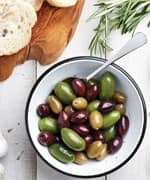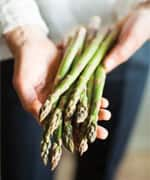Life Extension Magazine®
With the surge in studies showing the health benefits of the Mediterranean diet, Greek food is experiencing a renaissance of its own.
Authentic Greek cuisine consists of the freshest seasonal ingredients, as varied as the topography of the land, ranging from the sea, to the countryside, to the mountains. Staples include olive oil, vegetables, fruit, and pulses (beans, chickpeas, lentils, dry peas), nuts and seeds, and natural grains, among others.
The Greeks tend to practice seasonal eating, consuming primarily locally grown, in-season foods. So, the cuisine is constantly changing, providing variety year-round. This fresh, seasonal diet is believed to be a key reason why Greeks tend to live even longer than their European neighbors.
In The Greek Vegetarian Cookbook, author Heather Thomas blends together the best of both modern and traditional Greek cuisine, with a focus on simplicity and authenticity. The cookbook features more than 100 simple and accessible vegetarian Greek dishes, including soups and salads, meatless breakfasts, healthy snacks, street food, contemporary “meze” dishes, and more.
On the following pages, Life Extension® presents four signature recipes from the book that highlight the flavor and variety of the region.
—Laurie Mathena

Did you know that…
Life expectancy at birth in Greece is 81.2 years, placing it at #25 globally.
The proportion of daily smokers in Greece is one of the highest among the European Union countries.
Greece is considered to have one of the lowest levels of socio-economic development in recent years.
A good approach to a healthy, long life includes a balanced diet, exercise, proper supplementation, smoking cessation, and limiting alcohol intake. Research shows that adherence to the Mediterranean diet can have protective effects against active and passive smoking.*
*Public Health. 2011 Mar;125(3):121-8.
Crunchy Greek Islands Salad

- Preparation time: 15 minutes
- Cooking time: 8-10 minutes
- Serves: 4
- 2 garlic cloves, peeled and halved
- 6 slices stale crusty white bread
- olive oil, for drizzling
- 14 oz/400 g juicy plum tomatoes, cut into chunks
- 1 large red or yellow bell pepper, seeded and cut into chunks
- ½ red onion, thinly sliced
- 3 ripe peaches, pitted and quartered
- 1 quantity Classic Greek Salad Dressing
- handful of arugula (rocket) or baby spinach leaves
- 3½ oz/100 g hard goat cheese, coarsely grated or shredded
- sea salt and freshly ground black pepper
1. Preheat the oven to 350°F/180°C/Gas Mark 4.
2. Rub the cut cloves of garlic over both sides of the bread. Tear the bread into pieces, lightly drizzle with olive oil, and place on a baking sheet. Bake for 8-10 minutes, or until the rusks are crisp and golden brown. Let cool.
3. Put the tomatoes, bell pepper, red onion, and peaches into a large bowl. Stir in the rusks and season with salt and pepper. Lightly toss in most of the salad dressing and let stand for 5-10 minutes for the flavors to mingle.
4. Pile the arugula (rocket) or spinach on top and drizzle with the remaining dressing. Sprinkle with goat cheese and serve.
Variations
Use quartered fresh figs or chunks of watermelon instead of peaches. Any grated strongly flavored hard cheese is suitable, or alternatively you could use feta. Add some cubed cucumber, capers, or olives to the salad.
Braised Artichoke Hearts and Peas

- Preparation time: 20 minutes
- Cooking time: 30 minutes
- Serves: 4
- 8 fresh artichokes
- 1 lemon, halved
- ½ cup (4 fl oz/120 ml) fruity green olive oil
- 1 onion, chopped
- 1 bunch scallions (spring onions), chopped
- 2 carrots, sliced
- 1 lb 2 oz/500 g podded fresh peas
- 2 ripe medium tomatoes
- 1 cup (8 fl oz/240 ml) vegetable broth (stock)
- juice of 1 lemon
- bunch of dill, chopped
- salt and pepper
1. Take a fresh artichoke and remove and discard any tough outer leaves and trim the top level. Scoop out the hairy choke from the base with a teaspoon and trim the stalk almost to the base of the choke. Squeeze the lemon juice into a bowl of cold water and put the artichoke heart into it to prevent it discoloring. Prepare the remaining artichokes in the same way and set aside.
2. Heat the oil in a large saucepan over low heat. Cook the onion, scallions (spring onions), and carrots, stirring occasionally, for 10 minutes, or until tender.
3. Add the drained artichoke hearts, peas, tomatoes, broth (stock), and lemon juice. Cover and simmer gently for 20 minutes, or until the vegetables are tender and the liquid has reduced. Stir in the dill and season to taste with salt and pepper. Remove from the heat and let cool.
4. Serve warm or at room temperature, with some crusty bread to mop up the juices.
Halloumi and Lentil Salad

- Preparation time: 10 minutes
- Cooking time: 35 minutes
- Serves: 4
- 1 generous cup (7 oz/200 g) brown lentils, rinsed
- 1 vegetable bouillon (stock) cube
- 4 tablespoons olive oil
- 2 red onions, chopped
- 3 garlic cloves, crushed
- 2 large carrots, finely chopped
- 2 celery stalks, finely chopped
- 12 oz/350 g baby plum tomatoes, halved
- juice of 1 lemon
- 1 tablespoon balsamic or red wine vinegar
- handful of dill, finely chopped
- 6 oz/175 g fine green beans, trimmed
- 9 oz/250 g halloumi, cut into 8 slices
- 2 tablespoons green pesto
- sea salt and freshly ground black pepper
1. Put the lentils into a saucepan and cover with cold water. Crumble in the bouillon (stock) cube and bring to the boil, then reduce the heat and simmer gently for 20 minutes, or until the lentils are tender but still retain some ‘bite.’ Drain in a strainer (sieve) and refresh under running cold water.
2. Meanwhile, heat 2 tablespoons of the olive oil in a large skillet (frying pan) over low heat. Cook the onions, garlic, carrots, and celery for 8-10 minutes, stirring occasionally, or until softened.
3. Add the tomatoes and drained lentils and cook for 5 minutes, stirring occasionally. Squash the tomatoes by pressing down on them with a spatula or wooden spoon. If the lentils start to stick, add a little water. Stir in the lemon juice, vinegar, and dill, and season to taste with salt and pepper. Remove from the heat and let cool a little.
4. Cook the green beans in a saucepan of boiling water for 3-4 minutes until tender but not soft. Drain and refresh under running cold water.
5. Dry-fry the halloumi in a nonstick skillet (frying pan) or griddle pan over medium heat for about 2 minutes on each side, or until crisp and golden brown.
6. Stir the remaining olive oil into the lentils and divide between 4 serving plates. Top with the green beans and halloumi. Drizzle with pesto and serve immediately.
Warm Griddled Asparagus Salad

- Preparation time: 10 minutes
- Cooking time: 30 minutes
- Serves: 4
- 1 lb 2 oz/500 g thin asparagus spears
- 2 garlic cloves, peeled
- pinch of sea salt crystals
- 4 tablespoons fruity green olive oil, plus extra for brushing
- juice of 1 lemon
- small bunch of Greek basil, chopped
- 3 tablespoons chopped shelled pistachios
- pinch of red pepper (chilli) flakes
- 3 oz/80 g feta cheese, crumbled
1. Trim the woody ends off the asparagus or just snap them off with your fingers. Brush them lightly with olive oil.
2. Heat a griddle pan over medium-high heat and, when really hot, add the asparagus in a single layer (cook in batches, if necessary – don’t overcrowd the pan). Cook for 6-8 minutes, turning occasionally, until the asparagus is just tender and starting to char on both sides.
3. In a pestle and mortar crush the garlic and sea salt crystals. Mix with the olive oil and lemon juice in a small bowl until well amalgamated. Stir in the basil.
4. Arrange the asparagus on a large serving platter and drizzle the dressing over the top. Scatter with the pistachios and red pepper (chilli) flakes, and crumble over the feta. Serve immediately while it’s still warm.

Tip
If preferred, you can roast the asparagus in a preheated oven at 400°F/200°C/Gas Mark 6 for about 10 minutes.
Variations
Use toasted flaked almonds instead of pistachios. Top with goat cheese or shavings of Kefalotyri, Graviera, Parmesan or Pecorino.
Omit the feta and serve with fried or griddled halloumi.
Make the salad more substantial by adding tomatoes and griddled zucchini (courgettes).
If you have any questions on the scientific content of this article, please call a Life Extension® Wellness Specialist at 1-866-864-3027.
From The Greek Vegetarian Cookbook By Heather Thomas. Copyright © by Phaidon Press Limited. Reprinted by permission.
To order a copy of The Greek Vegetarian Cookbook, call 1-800-544-5440.

